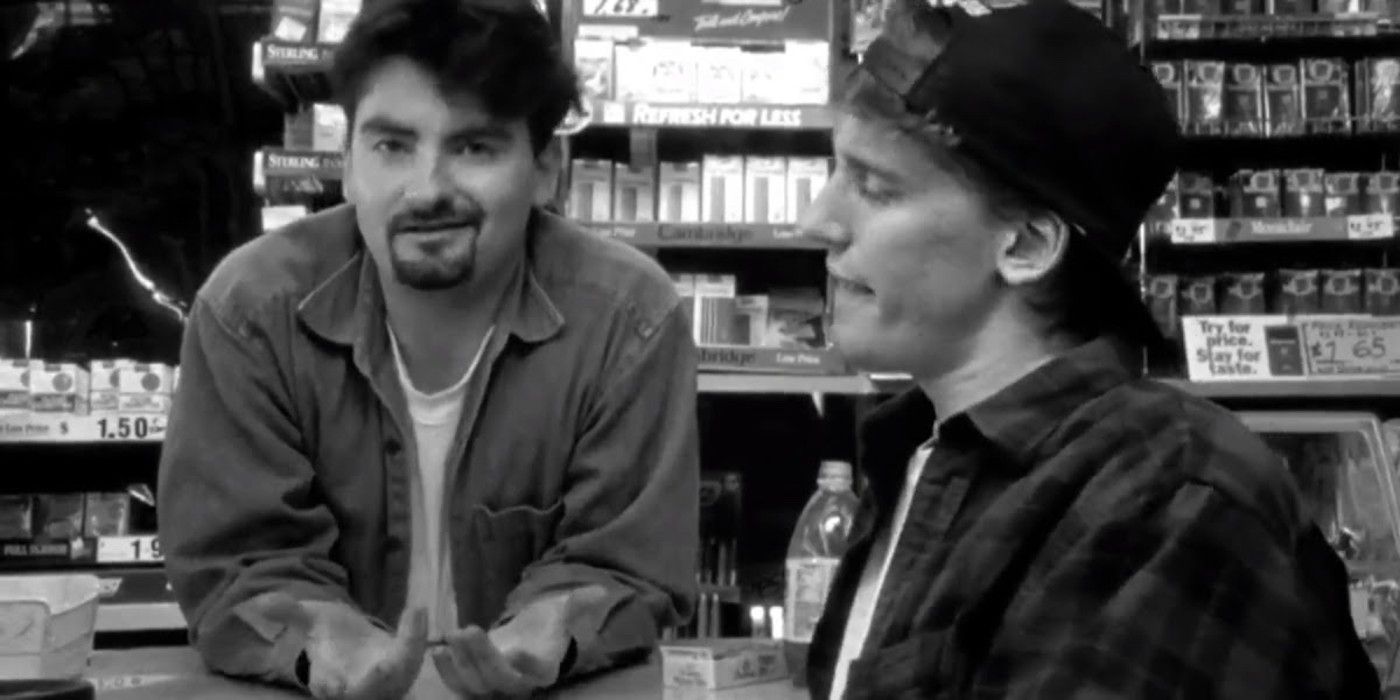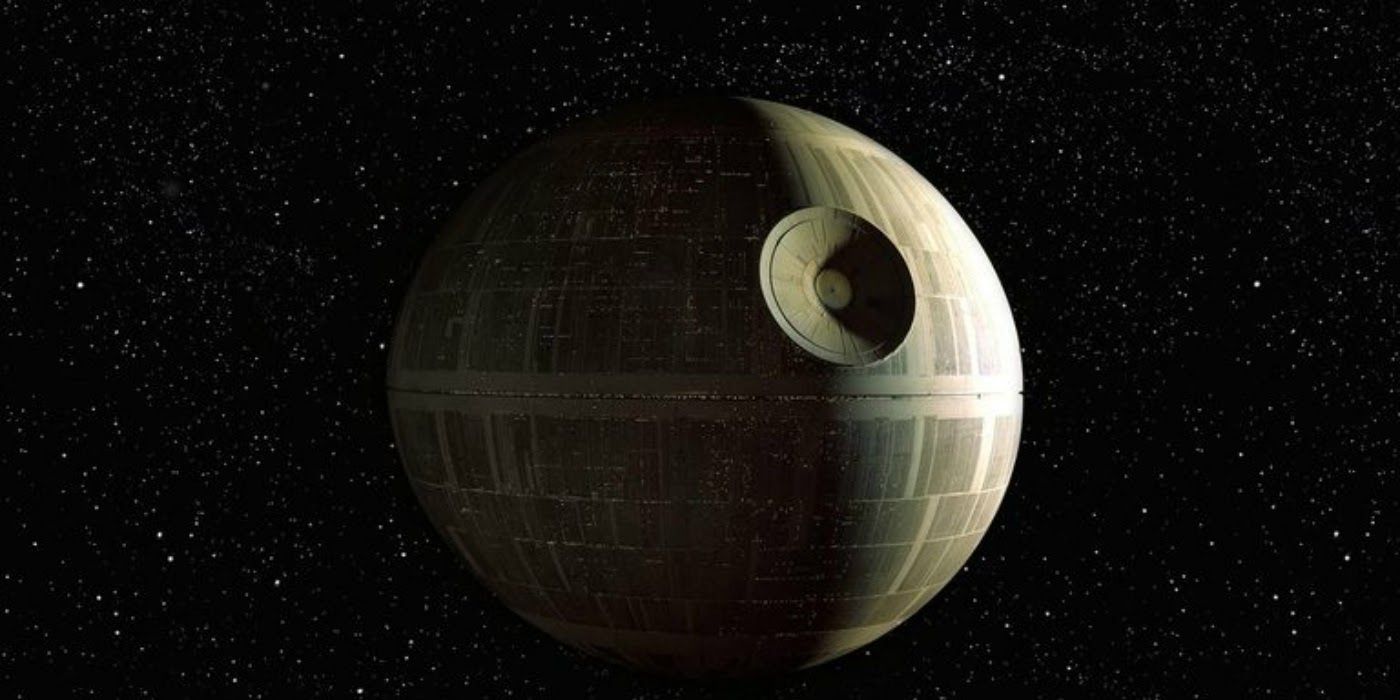Long before George Lucas' original Star Wars trilogy received its sequels, prequels, multiple Clone Wars animated series and The Mandalorian, it was the subject of endless fandom debate over the subtext of a sci-fi story about space wizards, aliens and fascist stand-ins. One notable example of this was the iconic Death Star contractors debate in Kevin Smith's Clerks, an early instance of nerd culture being casually discussed on-camera decades before such talk would become commonplace. Now, a variation of that conversation just so happened to take place on the season finale of The Mandalorian, titled "Chapter 16: The Rescue," albeit with a much darker tone.
For those unfamiliar with Smith's 1994 directorial debut, Clerks was a low-budget independent 'day in the life' comedy about Dante Hicks and Randall Graves, two slacker friends who work unbearably bland jobs at a New Jersey convenience store and video rental store sitting next to one another. Neither guy really enjoys their work – a running joke is how often Dante tells people that he's "not even supposed to be here today" – so they pass the time engaging with virtually everything else, from relationship issues to hockey games to conversations about Star Wars. The last one, an early instance of Kevin Smith's trademark pop culture-laced dialogue, stood out amongst moviegoers for offering a weirdly surreal introspective on the moral implications of blowing up something as blatantly evil as the Death Star.
During their conversation, Randall asks Dante whether he prefers The Empire Strikes Back or Return of the Jedi, with Dante picking Empire due to its more realistic, bleaker ending. Randall counters this by pointing out how in Jedi, despite its super laser being fully operational, the second Death Star was still under physical construction when the Rebels blew it up. Therefore, whereas A New Hope's Death Star only had Stormtroopers and Imperial officers onboard, its successor likely contained some independent contractors who might have been neutral in the Galactic Civil War and just trying to support their families, only to become war casualties anyway. This theoretically casts the Rebel Alliance in a morally ambiguous light compared to their straightforward "good guy" status from the original trilogy, a topic further explored in stories like Rogue One.
The Mandalorian, by comparison, reframes the Clerks conversation's laid back casualness into menacing taunt. During the opening scene, the Mandalorian and Cara Dune board an Imperial shuttle carrying cloning engineer Dr. Pershing, in hopes of using his ship to board Moff Gideon's cruiser, banking partially on Pershing's own established concern for Grogu's safety. However, one of the pilots attempts to counter their plan by taking Pershing hostage, resulting in a standoff with Dune.
Things then get personal when the officer recognizes Dune's facial teardrop tattoo, a symbol used by former Alderaan natives to mourn their home planet's destruction. Claiming to have been on the Death Star when it happened, the officer tries to turn the tables on her by questioning how many millions of people the Rebels killed on both battle stations combined, though he gets a bit carried away near the end of his speech, deeming Alderaan's destruction "a small price to pay to rid the galaxy of terrorism." This results in the officer becoming very, very dead via blaster shot and the good doctor getting taken away before the show's title cards roll.
Despite mainly attempting to throw Cara Dune off-guard, the Imperial officer's Clerks-related statement does tie a bit into her past and character development throughout The Mandalorian. Season 1 revealed she's a former Rebel shock trooper whose initial role was to cause as much trouble as possible for the Empire, likely sidestepping ethical complaints. Once the New Republic was established, however, the various peacekeeping jobs Dune received post-war weren't up to her tastes, leading to her adopting the life of a mercenary. She might have moved back into a more law-abiding path in Season 2 as both marshal for the planet Nevarro and later the New Republic, but it's possible that some of those earlier jobs for the Rebellion still rest on Dune's conscience after all this time.
Still, if this line of dialogue was meant as an homage to Clerks, it's a nice way of bringing things full circle. Kevin Smith rose to national prominence as a pop culture filmmaker whose regular usage of Star Wars references in his scripts made talking about the franchise seem cool to mainstream audiences. Now, with The Mandalorian being one of the most discussed TV shows in years, EVERYONE seems to be positively talking about Star Wars again. But this time around, the conversations are even more psychoanalyzed than something as simple as Death Star labor contractors.
Created by Jon Favreau, The Mandalorian stars Pedro Pascal, Gina Carano, Carl Weathers and Giancarlo Esposito. Season 2 is now streaming on Disney+.


